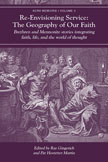| DFD |
||||||
|
|
The twentieth century witnessed some of the world’s most horrific atrocities: the Armenian genocide, World Wars I and II—which included the Nazi Holocaust, the Rape of Nanking, Hiroshima, and Nagasaki. Following World War II came the Cambodian Killing Fields, apartheid in South Africa, the Rwandan genocide, and the ethnic cleansing in Bosnia. The list of nightmares in which hurt and harm on an unimaginable scale were perpetrated against innocent human beings seems endless. Too few, however, are the accounts of people of goodwill who were willing to invest their lives in building a more compassionate, caring and humane world. The authors of Re-Envisioning Service tell deeply personal stories which recount how each distinctively grappled with life’s opportunities, enigmas, and dissonances, investing lives with meaning through vocational (and shorter-term) decisions made while building a vision of a more humane world. Readers will gain insight into some ordinary individuals who experience extraordinary lives pregnant with meaning, purpose, and generosity. They pursued a vision of service congruent with the communities of faith out of which they emerged—yet in striving to make a positive contribution toward a more genial world beyond “their own people,” they transformed the geography of those communities and, without exception, were themselves transformed. Whether writing as erstwhile educators, pastors, administrators, writers, developments workers, peace and conciliation consultants, the sixteen authors offer us a multi-lensed perspective through which we are privileged to see how even seemingly slight choices or carefully discerned directions, and even unwelcome disappointments, are woven together so that the trivia of each day’s endeavors construct a life of unanticipated significance. In the accounts which follow, the authors document how they overcame obstacles they encountered, learned valuable lessons from those they sought to serve, and developed enriching relationships that expanded their sense of community and belonging into distinctly different geographies and cultural contexts than those in which they were raised. In these chapters the writers have courageously given us access to lives thick and rich with joys, struggles, memories, dreams, losses, and passions. These stories, told sometimes with humor, occasionally with pathos, but always with humility, bear testimony to the communities of faith which nurtured in them the intrinsic value of pursuing a vision of healing and hope. Though the stories reflect the lives of particular individuals, the stories together give us a glimpse into the Brethren-Mennonite communities from which they came, where this promise of a world renovated by healing and hope was sung and storied, proclaimed from the pulpit, and shared across the kitchen table. Assuredly impacted by countervailing currents to violence and conflict which gave rise to movements like the Peace Corps and Doctors Without Borders amid wars and divisions that plagued the twentieth century, the writers in this text reveal being profoundly shaped by two additional dynamics foundational for their self-understanding. The Mennonite-Brethren communities in which their deeply held values and beliefs were shaped were collectivist-type cultures in which these communities upheld as the model of a good person someone who was generous, helpful, dependable, attentive to the needs of others, and eager to propagate and work for a kinder, gentler world. This ideal was, moreover, grounded in a resolute commitment to follow Jesus who exemplified selfless service of others. Since
we are shaped and sustained in our own altruistic commitments by
stories of those who lived with honorable purpose, the narratives
assembled here are worth telling and preserving for posterity. As
someone called to lead an organization that challenges and invites
people of all ages to learn and serve in many places of pain,
brokenness, and alienation, I celebrate that these stories will inspire
readers to consider serving a cause greater than personal aspiration or
ambition. I pray this text will bless generations yet unborn as these
accounts spur them and us to become agents of healing and hope. |
|||||





